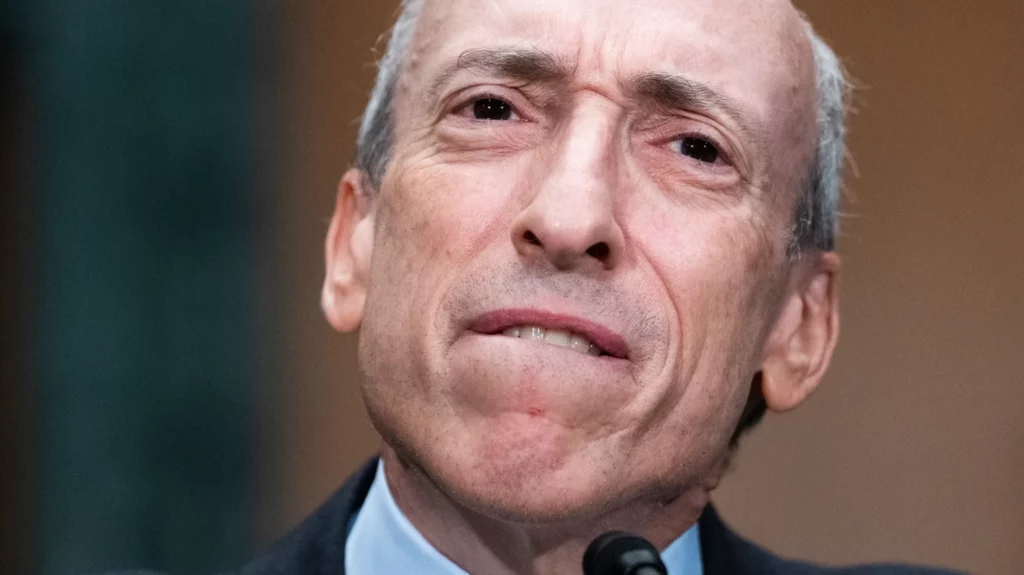Bitcoin Storage: US Banks Seek SEC Approval as They U-Turn on Crypto

Influential lobbying groups are urging the Gary Gensler's SEC to adjust accounting rules that currently increase the cost for US banks for crypto custody | Credit: Michael M. Santiago/Getty Images
bull Key Takeaways
- Financial groups lobby SEC to change accounting rules that make it costly for banks to hold crypto.
- Bipartisan lawmakers pressure SEC to revoke its accounting guidance, accusing the agency of overstepping authority.
- Banks face challenges navigating current SEC rules, advocating for changes to support wider adoption of crypto custody services.
Lobbying groups are urging the United States Securities and Exchange Commission (SEC) to adjust accounting rules that currently increase the cost for US banks to keep digital assets in custody on behalf of their clients.
This push comes as the regulatory body is also encountering bipartisan pressure from Congress. Both Democrat and Republican members have called for the guidance to be revoked.
Major Financial Trade Groups Lobby SEC for Accounting Rule Changes
A coalition of trade groups, comprising the Bank Policy Institute, the American Bankers Association, the Securities Industry and Financial Markets Association, and the Financial Services Forum, has formally requested the SEC modify current accounting standards. In a letter they for revisions to the existing guidelines that mandate public entities, including financial institutions, to record cryptocurrencies they hold in custody as liabilities on their balance sheets.
Under the present rules, when banks custody digital assets for their customers, these holdings are treated as liabilities. This requires banks to allocate equivalent assets to safeguard against potential losses. In turn, this ensures they meet capital requirement standards. The trade group argues this approach imposes unnecessary financial burdens on banks involved in the custody of digital assets. They claim it, potentially, stifles innovation and growth within the sector. Their proposal aims to relax these requirements. This, they suggest, would make it more economically viable for banks to engage with and support the cryptocurrency market.
Proposed Key Adjustments
The coalition of prominent financial trade associations has proposed specific adjustments to the SEC’s guidance on the accounting treatment of digital assets by banks and other financial institutions. Their request encompasses two main changes, aimed at refining how crypto assets are accounted for on balance sheets:
- The first proposed change involves narrowing the definition of what is considered a cryptocurrency asset for accounting purposes. The groups suggest excluding traditional assets that use blockchain technology for recording or transferring purposes, such as tokenized deposits. Additionally, they recommend excluding tokens that underpin SEC-sanctioned products, including spot-Bitcoin exchange-traded funds (ETFs), from being categorized under the broad crypto umbrella.
- The second proposal seeks to relieve regulated lenders from the obligation to list cryptocurrencies under their custody as liabilities on their balance sheets. However, this exemption would not eliminate the need for these institutions to transparently report their cryptocurrency-related activities within their financial statements.
These recommendations could alleviate regulatory and financial pressures on banks holding digital assets. This will, it is hoped, create a more supportive environment for the integration of blockchain technology and crypto assets into traditional banking systems while ensuring transparency and regulatory compliance.
The letter says :
“If regulated banking organizations are effectively precluded from providing digital asset safeguarding services at scale, investors and customers, and ultimately the financial system, will be worse off.”
The regulator says its accounting guidelines are essential, due to the distinctive risks and uncertainties associated with cryptoassets. It suggests these differ from other assets that banks hold on behalf of their clients. In a recent interview , SEC Chair Gary Gensler characterized the cryptocurrency industry as needing to improve the necessary and appropriate disclosures concerning securities.
Guidance Criticized By Lenders
The SEC’s Staff Accounting Bulletin No. 121 , issued in 2022, has been a point of contention for banks aiming to expand their services into the custody of digital assets for customers. Lenders have criticized this guidance, claiming it imposes prohibitive costs that deter them from entering the cryptocurrency custodian market. As a result, banks have struggled to secure a foothold in providing custodian services for the emerging Bitcoin ETFs. The likes of Coinbase Global Inc. and other crypto custody specialists like BitGo and Gemini, as well as companies like Fidelity appear to have captured the market.
The trade associations have voiced their concerns in a letter to the SEC, highlighting not only the missed opportunities in crypto custodianship but also the broader negative impact the guidance has had on the adoption of blockchain and distributed ledger technology for managing traditional assets. This effect, described as a “chilling effect,” underscores the regulatory challenges faced by the banking sector in embracing digital innovation.
In response, an SEC spokesperson referred to SAB 121 as “non-binding staff guidance” aimed at bolstering investor disclosures for entities managing crypto assets on behalf of others. Despite this stance, the practical implications of the guidance have already manifested. For instance, the Bank of New York Mellon Corp. reported minimal impact from its digital asset custody platform on its financials. Meanwhile, State Street Corp.’s plans for a crypto custody service are pending regulatory approval, even as it recently made cuts to its digital assets division. Jay Biancamano, the division’s former head, has reflected on the challenges of pioneering in digital custody and tokenization.
Financial Trade Groups Appeal to SEC for Revisions
In a letter, financial trade groups are seeking constructive dialogue with the regulator to revise contentious crypto custody accounting rules. This move coincides with increasing efforts by American lawmakers advocating for the complete revocation of the controversial bulletin. Momentum has been building on Capitol Hill after a report from the Government Accountability Office labeled the SEC’s guidance as a “rule” that falls under congressional oversight.
Earlier in the month, Representatives Mike Flood, (R-NE), and Wiley Nickel, a (D-NC), took a bipartisan stance by proposing a resolution to annul the SEC’s directive. In it, they accused the regulator of exceeding its jurisdiction. In the Senate, Cynthia Lummis (R-WY) introduced a similar bill.
Flood said :
“The SEC should not be making rules that affect bank custody. That’s a job for our prudential regulators.”
State Street and Congress Push for SEC to Reconsider Custody Rules
Donna Milrod, chief product officer and head of State Street Digital, expressed support for congressional efforts to address the SEC’s Staff Accounting Bulletin No. 121. However, she emphasized the importance of collaboration between the SEC, banks, and accounting firms. She advocates for at least modifying the bulletin to alleviate the balance sheet requirements for banks under prudential regulation. Meanwhile, BNY Mellon has chosen not to comment. It has, however, previously suggested to the SEC that banks should be exempt from these obligations.
The Republican-led House Financial Services Committee could vote on the bulletin’s repeal as early as this month, according to sources. In the Senate, Lummis is working to collect the necessary 30 signatures for a discharge petition. This would speed up the process by bypassing a committee vote and directly bringing the issue to the Senate floor.
However, the path forward for this legislative effort remains uncertain. Gaining sufficient support, particularly from Democrats and the White House, to enact the legislation is still a significant hurdle.


